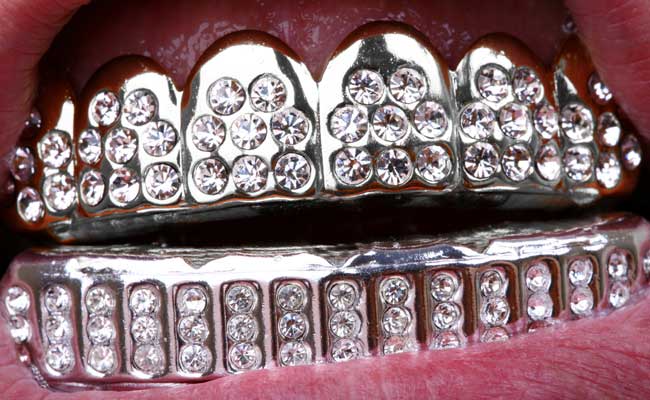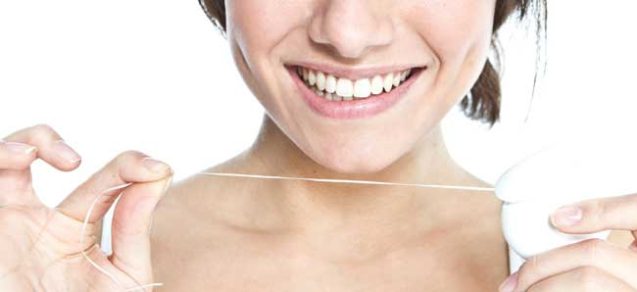By admin
15 Aug, 2017
Cosmetic Dentistry, Dental Health, Dental Hygiene, Dental Tips, General Health, Lifestyle, Oral Health
caring for dental grills, dental grills, dental history, gold teeth, grillz

A Brief History of Grills
“I got my mouth looking something like a disco ball
I got the diamonds and the ice all hand set
I might cause a cold front if I take a deep breath
My teeth gleaming like I’m chewing on aluminum foil”
– Grillz, Nelly (featuring Pall Wall & Ali & Gipp)
Grills (or grillz) are, if not popular, at least fairly recognizable these days. Made of precious metals (gold and platinum being the most common) and often studded with diamonds, most grills are removable and worn over the front teeth. But where do they come from?
Although many people would point to Nelly and his 2005 song, “Grillz,” as the starting point for the trend, they’re actually much older than that. (And no, we’re not just talking about rappers like Slick Rick, Flavor Flav, and Big Daddy Kane from the 80s and 90s, either). We’re talking ancient history.
In ancient Italy, between 800 and 200 BC, wealthy Etruscan women wore teeth woven together with gold wire the thickness of a rubber band. The wire held together teeth that had been removed and were placed back into the mouth, so they made eating difficult. The practice wasn’t necessarily common, but archaeologists found documentation of around 20 sets of teeth woven together in this way. Etruscan civilization vanished as the Romans took over Italy, and this fashion trend died with it.
In Latin America, Mayans actually cut small holes into their teeth and filled them with precious stones, typically jade. Again, this was a trend that only royalty and the wealthy could afford. Although the Mayan civilization has disappeared, many people in southeastern Mexico, Belize, Honduras, and Guatemala still wear gold tooth jewelry today.
In ancient Filipino myths, the creator of the world, a deity named Melu, had gold teeth—and during what was the Middle Ages in Europe, Filipinos were filing down their teeth and decorating them with gold. Some of these decorations included gold bands that covered the entire front row of teeth; the oldest date to around 1300 AD.
As the Renaissance began in Europe, dentistry was becoming more scientific and less superstitious—and Giovanni de Arcoli, a 15th century Italian professor of medicine, became the first author known to recommend filling cavities with gold to preserve them.
Grills started appearing in rap and hip hop videos in the 80s, and became even more popular as Southern rap began to take off in the 90s and early 2000s. And now, they’ve jumped into mainstream culture, as celebrities like Madonna, Miley Cyrus, Katy Perry, and even Ryan Lochte have sported them in recent years.
You might expect a dentist to come out against grillz as a health hazard, but no studies have proven that they’re bad for your teeth. As long as they’re removed and the teeth are brushed and flossed as appropriate, they shouldn’t cause health problems. Some metals can cause irritation; if it causes a rash, or bleeding, or other problems, just stop. Similarly, don’t clean them with anything toxic to ingest (like most jewelry cleaners), and don’t try to attach them permanently to your teeth with glue. But if you want to wear a grill, and you use some common sense and take care of your teeth, you’ll be part of a long tradition of dental jewelry.
We can’t recommend a jeweler to create your grill, but if you have any questions about dental instruments—either ornamental or for health reasons—please give us a call at (661) 952-7865 and we’ll be happy to answer your questions.
More
By admin
18 Mar, 2017
Dental Health, Dental Hygiene, Dental Tips, General Dentistry, General Health, Lifestyle, Oral Health
cavities, gingivitis, gum disease, plaque, tartar, teeth cleaning
Why do I Need Professional Teeth Cleanings?
Let’s look at five reasons why you should get your teeth regularly cleaned.
1. We check for oral cancer
With cancer, the sooner it’s detected the better chance you have of successfully getting rid of it. Oral cancer is no different. During each teeth cleaning, we check for any signs of oral cancer.
2. Cleanings help prevent cavities
Brushing and flossing every day will do wonders in maintaining a healthy mouth. But, sometimes you may forget to floss, or maybe you had a few too many sodas and candy bars. Our dental hygienists will ensure that your mouth is free of plaque, and can also give you tips for your at-home cleaning if they see something you may not be doing.
3. Cleanings help prevent gum disease
Gum disease can easily creep up on anyone. It is often painless until it becomes a bigger problem. When diagnosed with gingivitis, it can still be reversed with proper gum maintenance.
Once gingivitis progresses to periodontal disease, it requires ongoing professional care to prevent further damage to your mouth. Professional cleanings at twice a year drastically reduce the risk of gum disease ever starting.
4. Having a healthy mouth contributes to a healthy life
Poor oral health has been connected with diagnoses for diabetes, heart disease and pregnancy complications. Keeping your gums and teeth healthy will help prevent the occurrence of these diseases.
5. Regular cleanings are cheaper than taking care of oral problems
Receiving two professional cleanings a year may be an expense you don’t like to see. However, teeth cleanings are much cheaper than other procedures, such as root canals, scaling and root planing, and dental implants.
There is nothing better than a freshly cleaned mouth! Our dental hygienists will make sure you have pain free experience, and you can leave knowing you’ve taken a giant leap forward in maintaining a healthy smile.
If you have more questions about our professional teeth cleanings, or if you’d like to schedule an appointment, please call your Lancaster dentist at (661) 952-7865.
More
Imagine you are eating a big, juicy steak cooked to perfection. You cut out a chunk of steak place it in your mouth. The first bite is delicious, and the second bite is even better.
But then, in your fervor for chewing, you forget where the steak ends and where your cheek begins. Before you know it–chomp!–a bite that was intended for that tasty piece of steak caught your cheek. It’s painful and irritating, but you can get past the pain.
The next day, your wound is healing well, but unfortunately during lunch you bite down on it again. Now it’s official: you have a full blown canker sore. While not all canker sores are self-inflicted, it’s good to know what causes canker sores and some remedies you can implement to promote healing while reducing pain.
For the most part, canker sores are more of a nuisance than a health issue. They can appear on the inside of your lips, cheeks and on your tongue. They can either be caused by trauma (like biting on the inside of your cheek or braces irritating your mouth) or other factors like stress and the types of food you eat.
Avoid agitating your canker sore
- Try not to hit it with your toothbrush.
- Steer clear of foods that will annoy your canker sore, including crunchy, dry, or acidic foods–especially citrus!
- If you have braces, apply wax where the canker sore comes in contact with them. If your braces or dentures continue to cause discomfort and canker sores, your dentist may be able to make the proper adjustments to fix the issue.
Since most canker sores go away on their own, the best thing you can do is manage the pain
- Gargle with salt water. Mix about ¼ to ½ teaspoons of salt with eight ounces of warm water. Put about two to three ounces of water into your mouth at a time and swish it around for 20-30 seconds, then spit it out. Continue to do this until all of the water is gone.
- Consider using a local numbing agent. Products like Oragel can be applied to the canker sore and numb it for temporary relief. These types of products contain benzocaine, so please read all cautions before applying.
- Take over-the-counter pain relief medication, like ibuprofen.
If your canker sore doesn’t heal within a few weeks, it’s time to see a dentist. If your canker sore makes it too painful to eat or drink, consider seeing your dentist before the three week mark. Make an appointment with your local Lancaster dentist if you think you may need additional canker sore treatment.
More
What You Need To Know:
The Effect Diabetes Has On Oral Health
Diabetes affects every aspect of your life. From ensuring your blood sugar is at the right level to keeping up with regular exercise, managing diabetes is no easy task. You must be aware of many complications that can arise from diabetes, and your oral health is no exception. Since it’s National Diabetes Month, we have provided information and tips to consider regarding the relationship between diabetes and your oral health.
According to the Centers for Disease Control, 29.1 million Americans have diabetes—and 8.1 million of those do not know they have the disease. If you’re not sure if you might have diabetes, the first step to taking care of your body is finding out if that’s the case. Some common symptoms of diabetes include:
- Blurred vision
- Hunger and fatigue
- Peeing more frequently while also being thirstier
- Dry mouth and itchy skin
More symptoms that can indicate longer term damage caused by diabetes include:
- Yeast Infections (for both genders)
- Pain or numbness in your legs and feet
- Cuts or sores that heal slowly
If you are experiencing these symptoms, go see your physician and get tested for diabetes. For your oral health, the symptoms take a while longer to show that actual damage that is occurring in your mouth if left untreated. Keep notice for symptoms like:
- Puffy, swollen gums that bleed when brushed or flossed
- Loose teeth
- Bad breath
- Receding gums
These are all signs of gingivitis, which if left untreated, can turn into periodontitis.
How does diabetes contribute to gum disease?
There are a few major ways diabetes affects your mouth. First, if your blood sugar levels are left unchecked, the glucose level of your saliva rises. Glucose is a type of sugar, and bacteria loves sugar, which will speed up the progress of gum disease. Second, with diabetes, your blood vessels thicken, making it harder for them to deliver oxygen and nutrients, as well as to take away waste. Lastly, a symptom of diabetes is dry mouth. Saliva helps keep the bacteria from sticking to your teeth, and a lack of saliva makes it easier for plaque and tartar to develop.
How do I prevent gum disease caused by diabetes?
- Control your blood sugar levels. This is done in many ways, such as taking insulin injections, eating different foods, exercising, and visiting your physician regularly.
- Brush and floss every day — This advice may seem obvious, but it’s tried and true. Removing plaque from your gumline and stimulating your gums are an excellent way to prevent gum disease.
- Visit your dentist for teeth cleanings — If you don’t have signs of gum disease yet, stay up to date on your regular teeth cleaning every six months. If you do have gingivitis or periodontal disease, a deeper clean will be required to prevent further tooth damage.
Whether you have diabetes or not, it is still very important to take care of your mouth. Recent studies have shown that not only are people with diabetes more likely to be afflicted by periodontal disease, but people with periodontal disease are more susceptible to getting diabetes as well.
While diabetes and periodontal disease can affect your quality of life, if treated early and often, you can mitigate much damage caused by these diseases. Call (661) 952-7865 to see how we can help today.
Sources:
http://www.diabetes.org/living-with-diabetes/treatment-and-care/oral-health-and-hygiene/diabetes-and-oral-health.html
http://www.diabetes.org/living-with-diabetes/treatment-and-care/oral-health-and-hygiene/warning-signs.html
http://www.mouthhealthy.org/en/az-topics/d/diabetes
More
By admin
01 Nov, 2016
Dental Health, Dental Tips, General Dentistry, General Health, Lifestyle, Oral Health, Preventive Dental Care
flossing, flossing alternatives, interdental brushes, waterpik
Flossing: In or Out?
It’s been six months since your last teeth cleaning. You arrive at your appointment and get called to head to the back by your hygienist. As she begins cleaning your teeth, she asks the question we all dread. “How often do you floss?” If you’re like many people, you might stretch the truth, or justify telling a white lie since you DID use a toothpick after dinner a few nights back.
Maybe now—lucky you!–you won’t have to answer that question any longer. Just recently the USDA and Department of Health and Human Services stated that flossing has been not been proven to be effective, and removed it from their dietary guidelines.
Well, slow down, my friend. You’re not off the hook just yet.
While this bold statement is technically true, there are still a few things to consider. First, the guidelines don’t say that flossing is bad or ineffective; they’re just saying there isn’t enough evidence in studies to prove it does help. The difference may feel like a matter of semantics, so for your own peace of mind, ask any dentist if you should floss. But you probably already know what their answer will be.
Your teeth consist of five surfaces, and brushing your teeth will hit all but two. Flossing will take care of the two remaining surfaces (the surfaces between your teeth) and ensure that plaque does not become tartar, which eats away at your teeth and gums. While flossing can help prevent tooth decay, a study by the Central for Disease Control shows that only 30% of the U.S. population flosses daily.
If you’re one of the 70% of people who don’t floss daily, you should know there are many alternatives to floss out there that can be just as effective in cleaning between your teeth.
Interdental Brushes – These are little brushes that you used to brush in between your teeth. People find these much easier to use than floss, and are good for people who have braces or larger gaps between their teeth.
Waterpik – The waterpik shoots a small, strong stream of water that can fit between small crevices in your teeth. It’s great to use for washing away plaque that can gather in pockets, but can take more time to master than floss or interdental brushes.
Floss Picks – A floss pick is a small piece of floss attached to a handle. These have become popular in recent times due to how convenient they are to use, but there are a few things to consider when using them. Since the floss is attached to a handle, manipulating the floss to hit all of the surfaces of your teeth can be difficult. Additionally, the recommended amount of floss to be used in a session is 12-18 inches, and the typical floss pick is only about two inches. Consider using more than one floss pick per session.
Regardless of what technique you use to clean between your teeth, the overall consensus is that anything is better than nothing.
Have a difficult time flossing every day? Start by doing it three times a week. Flossing takes time and doesn’t give immediate results, but think of it as an investment in your mouth’s future.
If you have any concerns about flossing, reach out to your Lancaster, CA dentist today. Just think about how good it will feel to tell your dentist and hygienist that you’ve been consistently cleaning in between your teeth!
More





